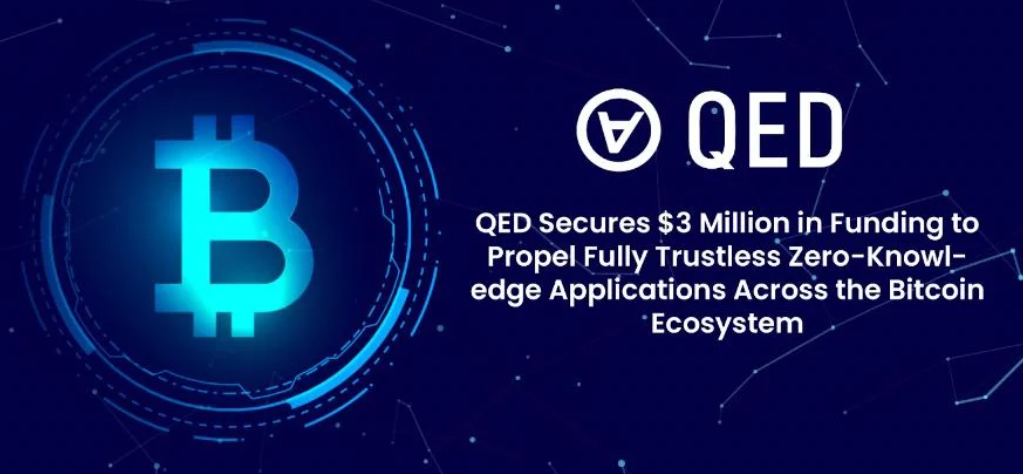QED, the world’s pioneer in zk-Native blockchain protocol, revealed today its successful $3 million funding round, spearheaded by Arrington Capital and joined by a lineup of renowned venture capital firms and entities including Paper Ventures, Starkware Draper Dragon, Blockchain Builders Fund, Lbk Labs, Valhalla Capital, Edessa Capital, and Anagram Ltd.

QED’s groundbreaking technology, developed by the same visionary team behind modular arithmetic in TapScript, introduces a novel approach to expanding BTC’s application scope. Through QED, decentralized applications can locally validate transactions, offering users limitless computation for a fixed gas fee. This pioneering method ensures that each user’s public key operates as a personalized ZK circuit, featuring ‘smart signatures’ accessible from the state, resembling a smart contract.
Carter Jack Feldman, QED’s Founder, emphasized, “Bitcoin’s historic lag in smart contract and decentralized application support hasn’t hindered its potential beyond being just digital gold. We envision it as the cornerstone of the entire decentralized economy.” He continued, “QED serves as Bitcoin’s execution layer, harnessing ZK proofs to unlock functionalities like smart contracts and DeFi while upholding Bitcoin’s security. We’re trailblazing a new frontier for decentralized applications leveraging Bitcoin’s $1.01 trillion and expanding market cap.”
QED aims to tackle various challenges in Web3, including blockchain development hurdles, scalability constraints, and subpar user experiences. As the world’s first horizontally scalable blockchain, it achieves enhanced throughput by involving more network nodes and enables any Web2 developer to craft a QED smart contract using mainstream programming languages like JavaScript and Python.
With QED’s Dapen Web IDE (integrated development environment), developers can swiftly build before deploying smart contracts onto the QED protocol. A notable feature is its end-to-end Zero-Knowledge Proof (ZKP) recursive verification, spanning from local transaction proof to final block proof, ensuring QED’s robust security and adaptability as the ideal execution layer for all blockchains and zero-knowledge virtual machines (zkVMs).
Michael Arrington of Arrington Capital expressed, “We are drawn to outstanding teams, and QED shines as one that will significantly contribute to the Web3 ecosystem. QED’s distinctive approach to securely scaling horizontally with a TPS that escalates with usage will spark a new era of smart contract utilization and applications, poised to meet the demands of both native and new participants in web3.”
QED supports all Layer-1 chains and WebAuthn Wallets, while accommodating existing zkVMs and boasting the capability to facilitate millions of User Operations per second (UOPS). Its robust security model ensures high censorship resistance and front-running immunity.
Looking ahead to 2024, QED has an ambitious roadmap, including the Testnet launch for the decentralized proving network early in the year, swiftly followed by the QED mainnet and a token event.


